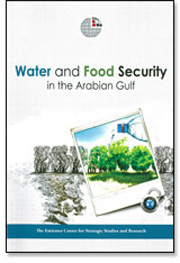Book contents
- Frontmatter
- Contents
- Figures and Tables
- Abbreviations and Acronyms
- Foreword
- Introduction
- Keynote Addresses
- Water Security in a Changing World
- Water Security in the Arabian Gulf Region
- Water Resource Management in the Arabian Gulf Region
- Regional and International Food Security
- Water and Food Security in the UAE
- 9 Water Security in the UAE: Challenges and Opportunities
- 10 Food Security in the United Arab Emirates
- Contributors
- Notes
- Bibliography
- Index
9 - Water Security in the UAE: Challenges and Opportunities
from Water and Food Security in the UAE
Published online by Cambridge University Press: 05 September 2014
- Frontmatter
- Contents
- Figures and Tables
- Abbreviations and Acronyms
- Foreword
- Introduction
- Keynote Addresses
- Water Security in a Changing World
- Water Security in the Arabian Gulf Region
- Water Resource Management in the Arabian Gulf Region
- Regional and International Food Security
- Water and Food Security in the UAE
- 9 Water Security in the UAE: Challenges and Opportunities
- 10 Food Security in the United Arab Emirates
- Contributors
- Notes
- Bibliography
- Index
Summary
Scarcity of renewable water resources is a global challenge facing many countries, especially those located in the world's arid and hyper-arid zones. Statistics indicate that global water resources total around 1,386 billion cubic meters (bcm). Freshwater constitutes just a small percentage of this (around three percent), while the overwhelming proportion is salt water in the seas and oceans. Sixty-nine percent of that fresh water is in ice form, which only leaves 31 percent of the total fresh water that is readily accessible. Of this, 30 percent is non-renewable groundwater and only two percent is renewable, as shown in Figure 9.1. Thus, more than one billion inhabitants in developing countries suffer from a lack of drinking water and sanitation.
Water resource preservation has therefore become one of the world's major contemporary challenges, particularly in arid countries like the United Arab Emirates and the other GCC states. Studies indicate that the GCC states are experiencing a water deficit that reached 15 bcm in 2008, a figure which is expected to increase to 35 bcm by 2030. Hence, since the establishment of the federation in 1971, the UAE government has not only realized the importance of water and its role in economic, agricultural and demographic development, but also invested in the water sector, resulting in the establishment of the necessary infrastructure to develop these resources sustainably, including wells, dams to store rainwater, desalination plants, distribution networks and wastewater treatment plants. This required substantial capital investment, as well as significant operational costs that were borne by the state.
- Type
- Chapter
- Information
- Water and Food Security in the Arabian Gulf , pp. 225 - 264Publisher: Emirates Center for Strategic Studies and ResearchPrint publication year: 2013



